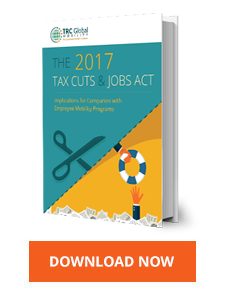

We outline these changes below and offer TRC’s recommendations on how to treat these benefits going forward.
Duplicate Housing Interest and Taxes
Duplicate housing interest and taxes were previously deductible, meaning they were tax assisted only for Social Security and Medicare taxes. Based on the new tax law, TRC is recommending a change to that tax treatment.
Mortgage Interest
TRC recommends that clients continue to treat mortgage interest as a deductible expense for Federal and State tax authorities, offering tax assistance only for Social Security and Medicare. Because the mortgage interest deduction is now limited to $750,000 on a primary residence (previous limit was $1,000,000), transferees with high mortgage debt may lose some of this deduction. Most transferees do not have more than $750,000 of mortgage debt so the affected group will be small.
Real Estate Taxes
Real estate taxes, along with any state and local income taxes, are now deductible only up to a combined $10,000 limit. Because of this, TRC recommends that clients treat these reimbursements as fully taxable to the employee, with tax assistance for all authorities (Federal, State, Social Security and Medicare). This is a change from previous tax years.
Household Goods and Final Move
Costs incurred for travel or for services delivered in 2018
These items will be fully taxable and treated as such. TRC recommends that clients provide the same level of tax assistance for these items as they have provided for all other taxable benefits in the past.
Costs incurred for travel or services delivered in 2017, but submitted or billed in 2018
Based on discussion with our outside tax consultants and relocation industry tax experts, TRC has determined that there is not a consensus on how to treat these items. There is a fairly even split between companies who are treating these under the old rules, since they occurred in 2017, and those who are treating them as taxable under the new law because the costs are being paid in 2018. TRC believes that clients can treat these expenses as nontaxable under the 2017 laws with little risk of IRS audit. However, we recommend that clients discuss this position with their internal tax group before making a decision.
To start your efforts towards compliance with the new relocation benefits tax changes, download this white paper to understand the:
- Changes to Federal Tax Treatment of Moving Expenses;
- New Challenges For High-Cost Locations;
- Reason Behind the Anticipated Popularity of Lump Sums;
- Impact on International Assignments; and
- 3 Immediate Steps You Can Immediately Take.





